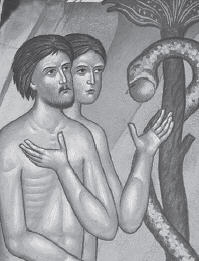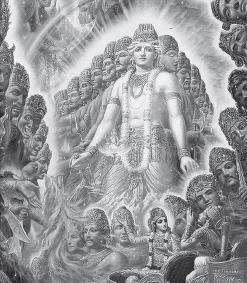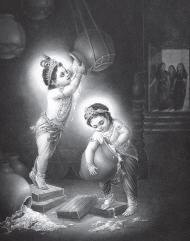Jesus had stated that he had more to give and, in the Vedic texts,
we get more a lot more information and knowledge about God.

Bhaktivinoda Thakura, a nineteenth century Vaisnava saint-scholar, explains how a true devotee should respect other religions and their practices, “When we have occasion to be present at the place of worship of other religionists at the time of their worship, we should stay there in a respectful mood, contemplating thus: ‘Here is being worshiped my adorable highest entity God, in a different form than that of mine. Due to a different practice of a different kind, I cannot thoroughly comprehend this system of theirs. But seeing it, I am feeling a greater attachment for my own system. God is one. I bow down before His emblem as I see here and offer my prayer to my Lord was adopted this different emblem so that He may increase my love toward Him in the form that is acceptable for me.”
I was born in a Hindu brahmana family and educated in a Christian convent school. In my school, I learnt about God equally from both the Hindu rituals at home as well as the Christian prayers at school. But it was only in my late teens when ISKCON devotees introduced me to the systematic philosophy of Krsna consciousness taught in the Vedic literatures that I started a serious study of spirituality. When I first came across the above statement of Bhaktivinoda Thakura, I felt I had discovered the missing link that could integrate my respect for the Christian tradition with my Krsna faith. The purpose of this article is similar: to help Vedic followers gain a deeper appreciation of their own path, while offering Christians a fresh look at their faith from the perspective of a Vedic follower.
The ultimate goal of both Christianity and Krsna consciousness is the same: to help practitioners develop love of God, to raise them from being materialists to becoming spiritualists and to assist them in the journey back to the kingdom of God. But are those teachings illumined equally in the Biblical and Vedic literatures?
Let’s explore the insights offered in the Christian and Vedic literatures regarding three subjects whose knowledge is highly helpful in developing our relationship with God:
1. The soul and its existential predicament.
2. God and His loving nature.
3. Devotion and its progressive development.
The soul
There are several references to the soul in the Bible, but its exact nature is not clearly delineated.
Why does the soul fall into this world?

The Biblical tradition tells the story of Adam and Eve, in which they fell from the Garden of Eden due to their eating the forbidden apple in disobedience to the order of God. Due to Adam’s original sin, all of humanity, having descended from him, is considered implicated in sin and is destined to suffer in material existence till it is rescued by the redeeming grace of God.
This story implies that all of us are victimized by all the sufferings of this world all the earthquakes, the cancers, the wars because, in the remote past, somebody else ate the forbidden apple. That we be sentenced to suffer for a sin we ourselves never committed seems, to any thinking person, patently unjust.
ISKCON scholar Ravindra-svarupa Dasa offers an alternative reading of the Adam story, a reading that also explains the cause of our fall from the Vedic perspective:
When the Bible talks about what Adam did, it’s talking about what we ourselves did. We were there “in the beginning” ourselves, because, being God’s offspring and made in His image, we are not material beings but spiritual beings. So we’re eternal. That’s the very nature of spirit: it never comes into being; it never goes out of being. That’s why in the Bhagavad-gita the soul is described not only as ajah, “unborn,” and nityah, “eternal,” but also as puranam, the oldest.
This means that all of us are primordial persons. When the Bible talks about Adam, then, it’s actually talking about us. As a matter of fact, “adam” is simple Hebrew for “man.” We can all step forward and introduce ourselves with that old palindrome: “Madam, I’m Adam.”
So we’re to blame. And what did we do? What’s our sin at the root of it all?
We decided that we didn’t want to serve God but wanted to become God ourselves. In other words, we became envious of God and wanted to take His place. That is our fall. And we are still fallen to this day because we still have that attitude.
This understanding not only helps us understand what we originally did wrong, but also what we need to do right to return back to God.
Do we have only one shot at living?

The widespread Christian notion is that if we don’t surrender to God by accepting Jesus as our savior in this brief lifetime, we will be sent to hell to suffer for the rest of eternity. This notion militates against the fundamental premise of theology: a loving, merciful God. After all, even ordinary parents, out of their love for their children, give them several chances to reform. So, does the claim that the supreme parent God gives us only one chance not limit His unlimited love?
The Vedic insights help us better fathom God’s unlimited love for us. The Vedic understanding is that we are souls, who in the human form of life get the chance to revive our forgotten relationship with God. If we neglect or reject this opportunity, then, according to our desires and our karma, we transmigrate from one body to another in 8.4 million species till we eventually again come back to the human form and get another chance. If we still don’t use that chance, then we keep going through the transmigratory cycle and getting chances to turn toward God till we finally make the right choice, return back to God and live happily with Him forever.
The coherence of the Vedic understanding on eschatology was appreciated even by Christian scholar and pioneering Sanskritist Sir William Jones: “I am no Hindu but I hold the doctrine of the Hindus concerning a future state to be incomparably more rational, more pious and more likely to deter men from vice than the horrid opinions inculcated by the Christians on punishment without end.”
Why do bad things happen to good people, especially innocent children?
This perplexing question, also known as “the problem of evil”, has been the bane of Christian theology. If we accept the Christian claim that we have had no lives before the present one, then on what basis are we given differing starting points for our life’s journey? Why are some people born in wealth families, some in poor families?
Although the Bible does say, “As you sow, so shall you reap,” the current Christian notion fails to help us understand how this is happening. The Vedic understanding of us as transmigrating souls helps us to see life from a far broader perspective of multiple lifetimes. Just as different seeds are reaped after different time durations, different actions bear reactions after different time durations some immediately, some later in the same lifetime and some in a subsequent lifetime. The karmic reactions that we carry over from our past human lives determine the initial conditions of our present lifetime.
Acceptance of the law of karma is not fatalistic, creating feelings of helplessness and impotence, as some people misunderstand. Nor is it psychologically damaging, creating haunting feelings of guilt, as some others allege. Rather a mature understanding of the impartial law of karma is highly empowering, as we understand that we still have control over our lives. By harmonizing with the universal laws of action, as explained in the God-given scriptures, we have the power to create a bright future for ourselves, no matter how bleak the present may seem to be. That’s why writer W. Somerset Maugham wrote in The Razor’s Edge, “Has it occurred to you that transmigration is at once an explanation and a justification of the evil of the world? If the evils we suffer are the result of sins committed in our past lives, we can bear them with resignation and hope that if in this one we strive towards virtue, our future lives will be less afflicted.”
Who is God?

In the Biblical tradition, there is not much positive knowledge about God His abode, personality, attributes and activities.
The Bible declares God to be the supreme object of love, but how does one love God without knowing Him? Can one love a concept or a cipher? Not knowing how God looks like, some Christians speculate that God, being the primeval person, must be an old man with a long beard. For example, in the celebrated Sistine Chapel located in the Vatican City, the ceiling depicts God as an old man creating Adam, who, paradoxically, looks more handsome, healthy and lovable than God.
Is self-existential knowledge of God absent in the biblical tradition because God being infinite is unknowable to us finite beings? While God is certainly infinite and so unknowable to us by our own efforts, an essential aspect of God’s infinitude and omnipotence is His ability to reveal Himself to us if He so wills. To say that God cannot make Himself known to us is to limit Him.
God has made Himself known as an all-attractive Supreme Person through the Vedic scriptures. At first glance, the Vedic texts may seem polytheistic, thus making the Vedic gods appear to be like the pagan gods whose worship the Old Testament forbids. But a deep and guided study of the Vedic scriptures reveals that, though they contain multifaceted rituals for multilevel forms of worship, they are conclusively monotheistic. In the Bhagavad-gita, Krsna is glorified as the one Supreme God with epithets strikingly similar to the Biblical eulogies of God. For example, the Bhagavad-gita (10.32) states, “Of all creations I am the beginning and the end and also the middle”, which is akin to the biblical declaration, “I am Alpha and Omega, the beginning and the end, the first and the last.” (Revelations 22.13)
At this point, most Christians will naturally wonder whether Krsna can be equated with the Biblical God especially when the Bible does not state this. Let’s consider this point based on scripture and logic:
1. Scripture: Jesus was crucified after only five years of preaching. That he had more things to reveal is clearly seen from his own statement, “I have yet many things to say unto you, but ye cannot bear them now.” (John 16:12) Can Christians be faithful to their own tradition and still be open to wisdom from scriptures other than their own? Such openness seems evinced in the Biblical statement, “All scripture is given by inspiration of God, and is profitable for doctrine, for reproof, for correction, for instruction in righteousness, that the man of God may be perfect, thoroughly furnished unto all good works.” (II Timothy 3:16-17) This verse is traditionally interpreted by Christians to refer to “all Biblical scriptures,” but perhaps the ecumenical spirit evident in the wording of the verse “all scripture” suggests a broader openness.
2. Logic: If a student, who is studying computer science at IIT Mumbai, comes to know that computer science is taught in greater detail at MIT, USA, will he restrict himself to IIT or will he avail of the education available at MIT? If he is interested in computer science, obviously, he will grab the opportunity to learn at MIT. Similarly, if a seeker of God, who is developing love of God in the Christian tradition, finds that greater knowledge of God is available in another tradition, the Vedic tradition, can he not avail of that tradition to enrich his knowledge of God and thus accelerate his love for God? Perhaps helpful in clarifying one’s priorities could be the soul-searching question: “Am I interested in Christianity or am I interested in God?”
God is great, but how?
The Biblical tradition repeatedly declares God’s greatness, but does not give much concrete description of His greatness. On the other hand, the Vedic description of Krsna graphically demonstrates the greatness of God. In the eleventh chapter of the Bhagavad-gita, Krsna gives Arjuna a glimpse of His awe-inspiring greatness by displaying His universal form, one of the greatest mystical visions in world literature. Arjuna saw within the universal form everything and everyone in existence. He saw all the planets, stars, and universes as well as all living beings, whether celestial, terrestrial, or subterranean. When Krsna was on earth He also exhibited His omnipotence by effortlessly conquering numerous powerful tyrants, who were the scourges of the universe.
Moreover, the quintessential Vedic text, the Srimad-Bhagavatam (1.2.11), gives a profound tripartite ontology of God’s existential greatness. God exists as three simultaneous, non-dual manifestations:
1. Brahman: A dazzling effulgence that pervades all existence
2. Paramatma: The localized personal expansion of God who resides in the heart of all living beings and in every atom
3. Bhagavan: The all-attractive Supreme Person who resides in His own abode in the spiritual world, reciprocating eternal love with His unlimited devotees.
What does God do in His kingdom?

The Abrahamic idea of God is primarily as a judge who rewards the pious and penalizes the impious. If that’s all God had to do eternally, even by earthly standards, His life would be quite boring. But devotional scriptures like Srimad-Bhagavatam explain that being a judge is only a tiny part of God’s multifaceted, nay omni-faceted, personality. Krsna has His own life of eternal love with His devotees in His kingdom. There He delights, not in exhibiting His godhood, but in reciprocating His devotees’ love.
To facilitate the reciprocation of pure love unimpeded by reverence, Krsna, in His supreme abode of love, plays the role of a mischievous child and engages other devotees to play the role of being His parents, relatives and friends. He also arranges that His devotees are not conscious that He is God; they see Him only as the most special, sweet member of their village. And He plays that role to perfection. For example, with those devotees who love Him in vatsalya-rasa (parental affection), He becomes an endearing naughty child who steals butter from their houses. The women complain to Krsna’s mother, Yasoda. Krsna artfully feigns innocence, and Yasoda is mystified until telltale butter on Krsna’s lips incriminates Him.
Skeptics who ask why God steals miss the essence of His pastimes: love. Besides, being God, Krsna owns everything, so there’s no question of His stealing anything. Yet Krsna “steals” to have fun-filled loving exchanges with His devotees.
To mistake a counterfeit note as genuine is unfortunate, but to mistake a genuine note as counterfeit is even more unfortunate. To mistake Krsna’s supramundane pastimes to be mundane, or worse still, immoral, is to mistake the genuine note the selfless exchanges of divine love to be counterfeit, the self-seeking dealings of mundane love.
The Vedic scriptures contain vivid descriptions of many pastimes of Krsna. Meditating on the pastimes of God makes awakening our love for Him easy and joyful.
Devotion

Jesus emphasized that the commandment to love God as the supreme commandment, thus pointing unambiguously to the ultimate destination of the spiritual journey. How we go about developing that love? And how do we know that we are actually making progress toward that goal? Biblical literature talk about three levels of love: eros (conjugal love), philadelphia (brotherly love) and agape (divine love), but there’s not much description about divine love. Certainly Christian saints like St. Francis of Assisi attained exalted levels of love of God, but there’s not much of a pathway delineated in the Biblical tradition to help us follow their footsteps. The Vedic scriptures are unique among all the spiritual literatures in the world in providing seekers the most detailed information about the landmarks on that inward journey.
The nine principal landmarks, as described in the devotional classics like the Bhakti-rasamrta-sindhu and the Madhurya Kadambini, are:
1. Sraddha (faith): The spiritual search begins with the basic faith that the spiritual realm exists and can be verified through personal experience.
2. Sadhu-saìga (association of devotees): The spiritual seeker associates with and learns from advanced spiritualists, by their words and examples, their guidance and inspiration.
3. Bhajana-kriya (adoption of spiritual practices): The serious seeker, under the guidance of a spiritual master, rigorously adopts devotional practices like mantra meditation and abstains from immoral activities like meat-eating, gambling, intoxication, and illicit sex.
4. Anartha-nivrtti (removal of impurities): The powerful spiritual practices gradually free him from self-destructive internal drives like lust, anger, avarice, envy, arrogance, and illusion, just like the heating of gold causes the separating away of impurities.
5. NisTha (conviction): This dramatic positive internal change gradually elevates his initial tender faith to an unshakable conviction, which arguments and counter-arguments can no longer disturb.
6. Ruci (taste): One starts relishing chanting and the remembrance of God due to the overwhelming taste (pleasure) that the divine remembrance brings.
7. Asakti (attachment): The devotee now becomes attached, addicted, to remembrance of God and to chanting His holy names and becomes absorbed in His divine remembrance.
8. Bhava (divine emotion): The devotee experiences divine emotions for the Lord joy, sorrow, anticipation, disappointment far more intensely than the emotions a worldly lover experiences for a beloved.
9. Prema (spiritual love): When these emotions mature into pure, selfless, undistracted love for God, then that love restores our spiritual vision, by which we can see Him, who is love personified, the supremely loving and lovable person, God, Krsna.
These nine stages are further divided into many more stages, thus helping seekers to precisely understand where they are situated and what they need to do to move forward. And the Vedic literatures also provide the seeker with powerful vehicles for the inward journey like yoga, meditation and, especially for our current age, the chanting of the holy names of God. Equipped with this clear map and efficient vehicle, thousands of people from the West and the East are embarking on and relishing the inward journey. Their divine delight is evident both in their sustained abstinence from all immoral indulgences, as also in their exuberant public dancing while chanting the holy names of their beloved Lord.
AFTERWORD
A pocket dictionary and an unabridged dictionary are both meant to help learn English, but the unabridged dictionary enables us to go into greater detail and depth. Similarly, both the Biblical literatures and the Vedic literatures are both meant to help us develop knowledge of and love for God, but the Vedic literatures help us to go into greater detail and depth. When our intellects are convinced philosophically about our existential predicament and about God’s insuperable greatness and our hearts are flooded with memories of God’s sweet dealings with devotees, it becomes much easier to offer our heart’s love and surrender to God, saying, as did Jesus, “Let Thy will be done, not mine.”
Evidently Jesus had many more things to say, but feared that his followers could not bear them then. When some of those things are revealed through the Vedic literatures, perhaps some of his modern followers may be able to bear them now.
